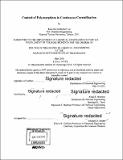| dc.contributor.advisor | Allan S. Myerson and Bernhardt L. Trout. | en_US |
| dc.contributor.author | Lai, Tsai-Ta Christopher | en_US |
| dc.contributor.other | Massachusetts Institute of Technology. Department of Chemical Engineering. | en_US |
| dc.date.accessioned | 2016-09-13T19:12:00Z | |
| dc.date.available | 2016-09-13T19:12:00Z | |
| dc.date.copyright | 2016 | en_US |
| dc.date.issued | 2016 | en_US |
| dc.identifier.uri | http://hdl.handle.net/1721.1/104203 | |
| dc.description | Thesis: Ph. D., Massachusetts Institute of Technology, Department of Chemical Engineering, 2016. | en_US |
| dc.description | Cataloged from PDF version of thesis. | en_US |
| dc.description | Includes bibliographical references. | en_US |
| dc.description.abstract | Continuous manufacturing has gained significant interest in recent years as the ultra-lean mode of pharmaceutical production. Albeit the increasing number of studies on the process dynamics in continuous crystallization, in particular in yield improvement and impurity separation, the research community lacks the systematic understanding of the control of polymorphism in continuous crystallization. Variations in the polymorphism of the active pharmaceutical ingredient can undermine the bioavailability and the downstream processability of the drug substance. Thus, precise control of the drug polymorphism is pivotal for delivering quality drug products to the patients. In this thesis work, we aimed to develop a series of steps forward in understanding the polymorph dynamics in continuous crystallization, notably in mixed-suspension, mixed-product removal (MSMPR) crystallization. We first elucidated the major intrinsic and extrinsic factors which govern the process polymorphism in both monotropic and enantiotropic polymorphic compounds. Using the monotropic L-glutamic acid as the model compound, two temperature regimes each with distinctive kinetic and thermodynamic characteristics were identified. It is found that at high temperatures, the polymorph dynamics is mediated by the relative thermodynamics of the polymorphs. The most stable form is likely to be the dominant form at steady state. On the other hand, at low temperatures, the interplay of the crystal growth and nucleation kinetics is found to play an important role in determining the final polymorphism. Similar results were identified in the enantiotropic p-aminobenzoic acid system where three temperature regimes were identified. The additional regime is located near to the transition temperature where the chemical potential of the two polymorphs are identical. The steady state polymorphism is thereby determined by the kinetic energy barriers for the crystallization of the polymorphs. The study of polymorphism was also conducted in cooling-antisolvent crystallization and the effect of solvent composition on the polymorph dynamics was studied. In addition, the dynamic pathways connecting the startup states to the metastable steady states and the stable steady states were determined. The polymorphic transition between these steady states was observed and analyzed. The fundamental understanding of the kinetic competition and the governing dynamics in polymorphic crystallization forms the backbone for developing the polymorph control strategies in this thesis. Based on the polymorph dynamic studies, we designed MSMPR cascade systems to control the process polymorphism. In addition, systematic procedures are established to facilitate the design and optimization of continuous crystallization with the objectives to control polymorphism, optimize process yield and achieve the target crystal size distribution. The operational window is determined within which these control objectives are achieved. As there are increasing interests in transitioning pharmaceutical manufacturing from batch to continuous processing, the results in this thesis should develop a substantial position in the body of scientific literature. | en_US |
| dc.description.statementofresponsibility | by Tsai-Ta Christopher Lai. | en_US |
| dc.format.extent | 231 pages | en_US |
| dc.language.iso | eng | en_US |
| dc.publisher | Massachusetts Institute of Technology | en_US |
| dc.rights | M.I.T. theses are protected by copyright. They may be viewed from this source for any purpose, but reproduction or distribution in any format is prohibited without written permission. See provided URL for inquiries about permission. | en_US |
| dc.rights.uri | http://dspace.mit.edu/handle/1721.1/7582 | en_US |
| dc.subject | Chemical Engineering. | en_US |
| dc.title | Control of polymorphism in continuous crystallization | en_US |
| dc.type | Thesis | en_US |
| dc.description.degree | Ph. D. | en_US |
| dc.contributor.department | Massachusetts Institute of Technology. Department of Chemical Engineering | |
| dc.identifier.oclc | 958138043 | en_US |
